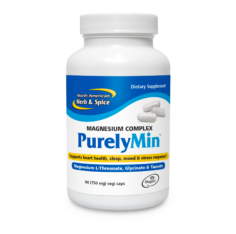Benefits, Deficiency Signs, Dietary Needs, and Supplementation
Magnesium is often overshadowed by other nutrients like calcium and vitamin D, but its role in maintaining overall health is just as critical. This essential mineral is necessary in more than 650 biochemical reactions in the body, impacting everything from muscle function to mood regulation. In this article, we’ll explore how magnesium benefits health, how to recognize signs of deficiency, what the daily requirement is, how to evaluate dietary sources, and the best forms of magnesium supplements to take.

How Does Magnesium Intake Benefit My Health?
Magnesium is vital for numerous physiological functions:
- Muscle and Nerve Function: Magnesium helps regulate muscle contractions and nerve impulses. It acts as a natural calcium blocker to help muscles relax, which can prevent cramps and spasms. Proper magnesium levels are also essential for nerve function, aiding in the transmission of nerve signals.
- Bone Health: Magnesium plays a key role in bone formation. It assists in the absorption and metabolism of calcium and vitamin D, both of which are crucial for bone strength. Adequate magnesium levels can help prevent osteoporosis and support overall skeletal health.
- Cardiovascular Health: Magnesium contributes to supporting a normal heart rhythm and supports cardiovascular health. It helps regulate blood pressure, and studies have shown that magnesium supplementation may lower the risk of heart disease.

- Energy Production: The mineral is a cofactor in the production of adenosine triphosphate (ATP), the primary energy carrier in cells. Without sufficient magnesium, energy production can be compromised, leading to fatigue and decreased physical performance.
- Blood Sugar Regulation: Magnesium is involved in regulating blood sugar levels and improving insulin sensitivity. This can be particularly beneficial for people with type 2 diabetes or those at risk of developing it.

- Mood and Sleep: Magnesium affects neurotransmitters that regulate mood and sleep. It can help alleviate symptoms of anxiety and depression and improve sleep quality by regulating the production of melatonin, a hormone that controls sleep-wake cycles.
- Brain & Memory Function: All the studies demonstrate magnesium supports nerve impulse conduction, which is critical to the overall function of the brain and cognitive strength. Magnesium, an electrolyte, plays a vital role in nerve transmission and neuromuscular conduction. It is also involved in the production of neurotransmitters and helps regulate their function. For example, Magnesium is a cofactor for the synthesis of dopamine and serotonin, which are neurotransmitters that affect mood, behavior, and appetite.

What Are Some Signs I’m Not Getting Enough Magnesium?
Magnesium deficiency can manifest in several ways, often showing up in both physical and mental symptoms:
- Muscle Cramps and Spasms: One of the most common signs of magnesium deficiency is muscle cramps or spasms. This occurs because magnesium helps regulate muscle contractions and relaxation. The heart itself is a muscle and can cramp or spasm. Chest pains or pain radiating from the jaw to the neck are indications that IMMEDIATE magnesium intake is required.
- Fatigue and Weakness: Low magnesium levels can result in decreased energy production, leading to feelings of fatigue and weakness.
- Nausea and Vomiting: These are less common but can occur with more severe deficiencies, potentially affecting gastrointestinal function.
- Abnormal Heart Rhythms: Irregular heartbeats or palpitations/arrhythmia can be linked to inadequate magnesium, which affects heart muscle function and rhythm.
- Tingling and Numbness: Neurological symptoms like tingling or numbness in the extremities may indicate a magnesium deficiency.
- Mental Health Issues: Low magnesium levels have been associated with increased symptoms of anxiety and depression. Magnesium’s role in neurotransmitter function and mood regulation is crucial for mental well-being.
How Much Magnesium Do I Need?
The Recommended Dietary Allowance (RDA) for magnesium varies based on age, gender, and life stage:

*These values ensure the body has enough magnesium to support vital physiological functions. Adjustments might be necessary based on individual health conditions or lifestyle factors.
Can I Achieve My Daily Needs If I Eat the Right Foods?
It is almost impossible to meet your daily magnesium needs, even through a well-balanced diet. Magnesium-rich foods include:
- Leafy Greens: Organic spinach, kale, and Swiss chard
- Nuts and Seeds: Almonds, pumpkin seeds, and sunflower seeds
- Whole Grains: Brown rice, quinoa, and barley
- Legumes: Black beans, chickpeas, and lentils
- Fish: Wild-caught salmon, mackerel, and halibut
- Fruits: Bananas and avocados
Incorporating these foods into your diet regularly can help you come closer to meeting your magnesium needs. However, certain factors like soil depletion and dietary restrictions may affect magnesium intake from food sources. Pumpkin seeds in particular are the highest food source of Magnesium. You would have to eat an average of 2-3 cups daily just to have enough. That’s 8-12 servings every day!

What Happens to Me After I Start to Stabilize My Magnesium Levels?
Stabilizing your magnesium levels can lead to a range of positive health outcomes:
- Improved Muscle Function: Reducing muscle cramps and spasms is one of the first noticeable benefits. Proper magnesium levels help maintain muscle relaxation and function.
- Better Sleep: Sleep quality and duration may improve as magnesium helps regulate melatonin production and promote relaxation.
- Enhanced Mood: Stabilized magnesium levels can improve mood and reduce symptoms of anxiety and depression, thanks to its role in neurotransmitter regulation.
- Increased Energy: With adequate magnesium, energy production can be optimized, leading to reduced fatigue and better physical performance.
- Heart Health: Improved heart rhythm and blood pressure balance are possible as magnesium supports cardiovascular function and reduces the risk of heart-related issues.
Why Are There So Many Different Types of Magnesium?
Magnesium supplements come in various forms, each with its absorption rate, benefits, and potential side effects. The cheapest and lowest absorbing form is called Magnesium Oxide. It has also been known to cause diarrhea, especially in individuals with sensitive digestive tracts, and it is not advised to seek out any Oxide forms of minerals. Too much Magnesium citrate will also cause agitation of the gut.
Which 3 Forms Are the Best?
- Magnesium Glycinate: This form is known for its high bioavailability and gentle effect on the stomach. Magnesium glycinate is bound to the amino acid glycine, which helps with absorption and reduces the likelihood of digestive issues. It’s often recommended for individuals with magnesium deficiency who need a high-quality supplement fast.
- Magnesium Taurate: This form is bound to taurine, an amino acid that supports cardiovascular health, including blood pressure and blood sugar responses. Additionally, it may help prevent blood clots, PMS, and damage to the brain/eyes/muscles. Magnesium taurate is well-absorbed and may help regulate blood pressure. It’s also less likely to cause laxative effects compared to other forms.
- Magnesium Threonate: Magnesium Threonate is bound to the amino acid, threonine. This form is noted for its potential cognitive benefits, as it may improve brain function and memory. It is also well-absorbed and can cross the blood-brain barrier, making it a good choice for cognitive health. It may also benefit bone and muscle function, protein and fatty acid formation, activation of natural B vitamins, blood clotting, and insulin secretion. The unique property of magnesium Threonate is that when taken orally, it crosses the blood-brain barrier and once it is in the brain, it increases the number of synaptic connections between brain cells.
In Conclusion
Magnesium is an essential mineral with numerous benefits for muscle function, bone health, cardiovascular health, energy production, and mood regulation. Recognizing the signs of deficiency and understanding your daily needs can help you make informed decisions about how to maintain optimal magnesium levels. While dietary sources can provide small amounts of magnesium, supplementation is often necessary for those with specific needs or absorption issues. Fatigue, muscle weakness, leg and foot cramps are our early warning system to take magnesium right away. For better overall health, pay close attention to these signs and symptoms.
Choosing the right form of magnesium supplement—whether it’s glycinate, taurate, threonate— can enhance magnesium’s effectiveness and address particular health concerns.
“If there was one supplement you should take daily for the rest of your life, it’s MAGNESIUM!” –Judy Gray, M.S, Founder and CEO
References:
https://ods.od.nih.gov/factsheets/Magnesium-HealthProfessional/
Kupferschmidt K. Resistance fighters. Science. 2016 May 13;352(6287):758-61. doi: 10.1126/science.352.6287.758. PMID: 27174968.
Moretti A. What is the role of magnesium for skeletal muscle cramps? A Cochrane Review summary with commentary. J Musculoskelet Neuronal Interact. 2021 Mar 1;21(1):1-3. PMID: 33657750; PMCID: PMC8020016.
Castiglioni S, Cazzaniga A, Albisetti W, Maier JA. Magnesium and osteoporosis: current state of knowledge and future research directions. Nutrients. 2013 Jul 31;5(8):3022-33. doi: 10.3390/nu5083022. PMID: 23912329; PMCID: PMC3775240.
Fang X, Wang K, Han D, He X, Wei J, Zhao L, Imam MU, Ping Z, Li Y, Xu Y, Min J, Wang F. Dietary magnesium intake and the risk of cardiovascular disease, type 2 diabetes, and all-cause mortality: a dose-response meta-analysis of prospective cohort studies. BMC Med. 2016 Dec 8;14(1):210. doi: 10.1186/s12916-016-0742-z. PMID: 27927203; PMCID: PMC5143460.
Rosique-Esteban N, Guasch-Ferré M, Hernández-Alonso P, Salas-Salvadó J. Dietary Magnesium and Cardiovascular Disease: A Review with Emphasis in Epidemiological Studies. Nutrients. 2018 Feb 1;10(2):168. doi: 10.3390/nu10020168. PMID: 29389872; PMCID: PMC5852744.
Yamanaka R, Tabata S, Shindo Y, Hotta K, Suzuki K, Soga T, Oka K. Mitochondrial Mg(2+) homeostasis decides cellular energy metabolism and vulnerability to stress. Sci Rep. 2016 Jul 26;6:30027. doi: 10.1038/srep30027. PMID: 27458051; PMCID: PMC4960558.
Dong JY, Xun P, He K, Qin LQ. Magnesium intake and risk of type 2 diabetes: meta-analysis of prospective cohort studies. Diabetes Care. 2011 Sep;34(9):2116-22. doi: 10.2337/dc11-0518. PMID: 21868780; PMCID: PMC3161260.
Moabedi M, Aliakbari M, Erfanian S, Milajerdi A. Magnesium supplementation beneficially affects depression in adults with depressive disorder: a systematic review and meta-analysis of randomized clinical trials. Front Psychiatry. 2023 Dec 22;14:1333261. doi: 10.3389/fpsyt.2023.1333261. PMID: 38213402; PMCID: PMC10783196.
Abbasi B, Kimiagar M, Sadeghniiat K, Shirazi MM, Hedayati M, Rashidkhani B. The effect of magnesium supplementation on primary insomnia in elderly: A double-blind placebo-controlled clinical trial. J Res Med Sci. 2012 Dec;17(12):1161-9. PMID: 23853635; PMCID: PMC3703169.
Fiorentini D, Cappadone C, Farruggia G, Prata C. Magnesium: Biochemistry, Nutrition, Detection, and Social Impact of Diseases Linked to Its Deficiency. Nutrients. 2021 Mar 30;13(4):1136. doi: 10.3390/nu13041136. PMID: 33808247; PMCID: PMC8065437.
Razzaque MS. Magnesium: Are We Consuming Enough? Nutrients. 2018 Dec 2;10(12):1863. doi: 10.3390/nu10121863. PMID: 30513803; PMCID: PMC6316205.
Shrivastava P, Choudhary R, Nirmalkar U, Singh A, Shree J, Vishwakarma PK, Bodakhe SH. Magnesium taurate attenuates progression of hypertension and cardiotoxicity against cadmium chloride-induced hypertensive albino rats. J Tradit Complement Med. 2018 Jun 2;9(2):119-123. doi: 10.1016/j.jtcme.2017.06.010. PMID: 30963046; PMCID: PMC6435948.
Sun Q, Weinger JG, Mao F, Liu G. Regulation of structural and functional synapse density by L-threonate through modulation of intraneuronal magnesium concentration. Neuropharmacology. 2016 Sep;108:426-39. doi: 10.1016/j.neuropharm.2016.05.006. Epub 2016 May 10. PMID: 27178134.
Zhou, H., Bi, GQ. & Liu, G. Intracellular magnesium optimizes transmission efficiency and plasticity of hippocampal synapses by reconfiguring their connectivity. Nat Commun 15, 3406 (2024). https://doi.org/10.1038/s41467-024-47571-3
Explore our trending products:
-
Herbal-zzZs – Melatonin-Free Sleep Support
$31.99 — or Original price was: $31.99.$27.19Current price is: $27.19. / month Add to cart -
Black Seed-Plus Capsules
$29.99 — or Original price was: $29.99.$25.49Current price is: $25.49. / month Select options This product has multiple variants. The options may be chosen on the product page -
Purely-C Whole Food Vitamin C Complex
$37.99 — or Original price was: $37.99.$32.29Current price is: $32.29. / month Select options This product has multiple variants. The options may be chosen on the product page -
PurelyMin Magnesium Complex
$39.99 — or Original price was: $39.99.$37.99Current price is: $37.99. / month Add to cart









































